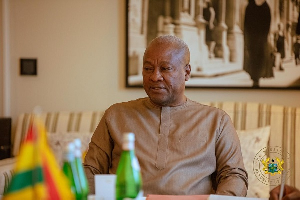Having graduated from Drawback University, Ghana with a Bachelor of Science, Prof Impossible Ghanaian, continued to pursue a Masters Degree and following it a Ph.D. He is well versed in many arts. For his immense contributions to life and academia, he was made an Associate Professor barely 5 years after his PhD. His Ph.D. however is unique – it s a Pull Him Down!
For a learned person like Prof. Ghanaian, you would expect him to deal with issues in a very objective and pragmatic manner – NOT SO AT ALL. In the analysis of contemporary problems, Prof is like the typical Ghanaian and it is such I wish to discuss in this article.
The typical Ghanaian is an escapist. A similar platform has given me the opportunity to address this but many weren’t listening and missed the point. August 2006 – September 2006 saw a lot of debate about homosexuality, drug barons, etc. flooding the airwaves. As usual, the first stop was “Oburoni” junction. I cannot fathom why we as a people are always quick to point accusing fingers at the “white man.” I am purely black (born and bred in Ghana) and I dare say it is because we have not taken many issues by the horns that we have many of the problems we do. Take for instance the recent increase in rape and sexual crime all over the country. Would we say that men just got sensual or they always have been? When our daughters, nieces, sisters and sometimes, sad to say, our mothers walk around semi-naked what should we expect? When TV stations air sensual programs that appeal constantly to our sexual appetites, what else will we expect? A friend remarked the other day that men are not “walking trees.” If you pull the trigger, you definitely expect the gun to go off, don’t you? A deeper look at the issue will clearly reveal that “Mr Oburoni” may have his part to play but we are indeed in the greatest fault. Interviewing some of those involved in the crimes will show clearly that the white man had no part really. There are those on drugs who were introduced to it by Ghanaian friends!
The Ghanaian’s second attitude to the analysis of issues is what I call the “talk-and-do-nothing syndrome.” Not so long ago, students in one of the country’s public Universities were plunged into a state of anxiety. Security was nothing to write home about. They were being stabbed, beaten and robbed of their cell phones, laptops and other valuables. As is Ghanaian, the SRC organized a Seminar on the security situation on campus. Disgusted, I didn’t even bother to make my way there to find out what would happen. Talk, Talk and more talk! You see I am in no way opposed to this but what talk have we not seen before. Instead of looking at pragmatic ways to solve the problem, everyone would want to express his views on the issue at hand. I recall an Executive Council meeting I attended barely a year ago. For approximately one hour (no exaggeration), the leaders went round in circles on one issue. Had I not intervened, only God knows when we would have finished “expressing our views!” How many discussions on the road accident situation, forest fires, etc have we not had? Discussions are important but the fact that we never arrive at solutions is bothersome to me.
Recently, there has been public outcry that homosexuality will not be accepted. I couldn’t agree more with these proponents. The question I ask is this: Have we looked objectively at the situation and planned measures at the National, Societal and family levels to curb this? Trust me, most social vices spring from the home level, through the societal and finally land at the national level. We always talk about the grass roots but are we really dealing with issues in our homes? Screaming that you do not want a thing most often won’t take it away. You have to take action. People sadly call in to radio programs, a great number of which need not be on the airwaves, and talk without the slightest idea of the topic being discussed. I readily welcome a debate between learned people with an objective to solving a problem not just to prove our learning! Talk is VERY cheap. We need to wake up and make constructive statements that will result in change and growth!
The other side of this is those who promise and never live up to those promises! I am pretty sure we’ve all encountered a DCE or two who’ve promised to fix that broken bridge or classroom block. His Toyota Land Cruiser seemingly has more important value until some gracious TV station captures the plight of the poor school children before the building caves in on them or there is loss of life on the bridge! Talk about talk being cheap. This is Prof Ghanaian for you! Not too long ago, a TV station telecast AGAIN a report on a bridge. They had reported it and they were assured something was “going to be done about it.” Nothing had! They had no choice but to report it again on air! Trust me on this one, if the bridge had caved in, they would have blamed the “oburoni” contractor for using inferior materials, etc. I would dare you to check the maintenance log and you would be amazed that “oburoni” may just not be at fault! Did I hear you say talk is cheap?
As if talk isn’t enough, some will just tear down others trying hard to deal head-on with the issues. I call to mind the plight of a medical doctor acquaintance of mine who tried to get an over-speeding reckless driver to slow down. You can imagine the number of people who, as we say in Ghana, “shouted on him.” We’re just ok with reckless driving and when someone tries to correct that he’s “too know.” Sometimes, I just wonder whether people understand in the long term the consequences of their actions. Do you realize that we could have lost another medical doctor to reckless driving that went unaddressed but those whose very lives depended on it? Recently, I amongst others tried to paint a picture of the reality of the problem we are encountering with regard to homosexuality. Trust me some of the comments were, to say the least, unintelligent. People who had no idea of the basis from which you were arguing made the most startling comments. Had they given more thought, I honestly think would have retracted those statements.
We all know of the unproductive people at work who will try hard to pull someone down (PhD) who deserves the promotion because they have MBAs (“me baa ha akye”). In most cases, this guy who deserves the promotion has worked hard to change the status quo and has inevitably hurt people in the process of change. Instead of accepting the truth of the fact that they don’t deserve this promotion, they try to malign him. Talk about Sanballats who oppose the rebuilding of the walls! If you won’t approach the problem to solve it, please, for Pete’s sakes, stop stifling others!
The truth is that the increasing many who are becoming objective in their analysis of issues are not superhuman. They have taken responsibility for their reactions to issues. Friends and fellow countrymen, if Ghana will arrive where we all hope it will, there has to be a paradigm shift in the way we approach a lot of issues. When we realize we have the problem or (in most cases) are the problem, we will be headed for change. For all PhD wielding Ghanaians, please throw out the papers; the time to be pragmatic and real is NOW!
Our attempts are often Pharisaic – cleaning the outside of the cup while the filth remains in it. Unless we change our attitude to issues, positive change will continually elude us. Not even the promises of government will change these lastingly.
Be a changer where you are!



















